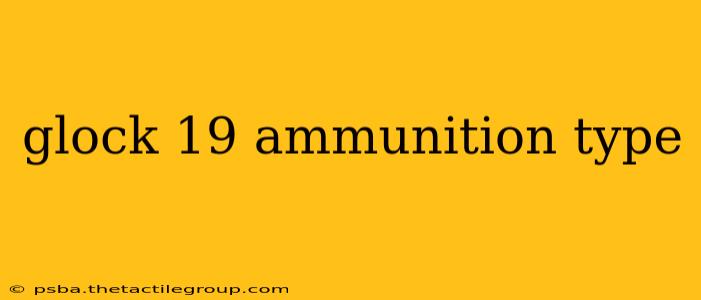The Glock 19, a highly popular and versatile handgun, is known for its reliability and adaptability. Choosing the right ammunition is crucial for optimal performance, safety, and accuracy. This guide explores the various ammunition types suitable for the Glock 19, covering factors like bullet weight, projectile type, and intended use.
Understanding Glock 19 Caliber
Before diving into ammunition types, it's essential to understand that the Glock 19 is chambered in 9x19mm Parabellum, often shortened to 9mm. This is a widely available and popular cartridge, offering a balance of stopping power, manageable recoil, and affordability. While the Glock 19 platform can be modified for other calibers (through aftermarket conversions), sticking to the factory 9mm is highly recommended for reliability and safety.
Types of 9mm Ammunition for your Glock 19
The 9mm cartridge offers a wide range of ammunition options, each designed for specific purposes:
1. Full Metal Jacket (FMJ)
- Characteristics: A full metal jacket round has a lead core completely encased in a metal jacket, typically copper or copper-plated. This makes it relatively inexpensive and suitable for target practice. FMJ rounds are less likely to expand on impact.
- Uses: Target shooting, training, and plinking. Less ideal for self-defense due to limited expansion.
2. Jacketed Hollow Point (JHP)
- Characteristics: JHP rounds feature a hollow cavity in the bullet's tip. This design allows the bullet to expand upon impact, increasing stopping power and reducing over-penetration. This is a critical factor for self-defense situations. Different JHP designs offer varying expansion characteristics.
- Uses: Self-defense, personal protection. The preferred choice for concealed carry.
3. Jacketed Hollow Point +P (+P+)
- Characteristics: "+P" ammunition indicates a higher pressure load than standard 9mm. "+P+" represents an even higher pressure. This results in increased velocity and stopping power, but also greater recoil. Using +P or +P+ ammunition requires verifying its compatibility with your specific Glock 19 model; some older models might not be rated for these higher pressures. Consult your Glock owner's manual.
- Uses: Situations demanding maximum stopping power, often favored by law enforcement. Not recommended for regular practice due to increased recoil and wear on the firearm.
4. Soft Point (SP)
- Characteristics: Soft point ammunition has a soft lead tip exposed at the bullet's nose. This facilitates expansion on impact, though typically less than a JHP.
- Uses: Hunting small game (though other calibers are generally preferred). Not recommended for self-defense or target practice due to potential for inconsistent expansion and increased risk of ricochet.
Factors to Consider When Choosing Ammunition
Beyond the bullet type, several other factors influence ammunition selection:
- Bullet Weight: Measured in grains (gr), bullet weight affects recoil, velocity, and energy. Heavier bullets generally have lower velocity but higher energy.
- Velocity: The speed at which the bullet travels, measured in feet per second (fps). Higher velocity generally translates to greater range and stopping power.
- Manufacturer Reputation: Choose reputable ammunition manufacturers known for consistent quality and reliable performance.
Safety Precautions
- Always consult your Glock 19 owner's manual for ammunition recommendations. Never use ammunition that exceeds the firearm's pressure rating.
- Proper storage is crucial. Store ammunition in a cool, dry place, away from children and unauthorized individuals.
- Always handle firearms responsibly and safely. Follow all applicable laws and regulations.
This guide provides a foundation for understanding Glock 19 ammunition types. Choosing the right ammunition depends heavily on its intended use. Always prioritize safety and responsible gun ownership. Remember to consult relevant safety resources and your owner's manual before handling any firearm or ammunition.

